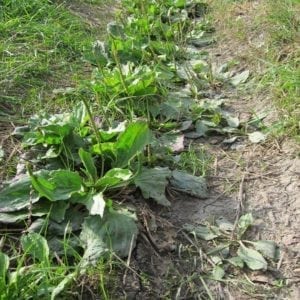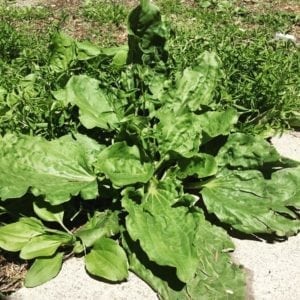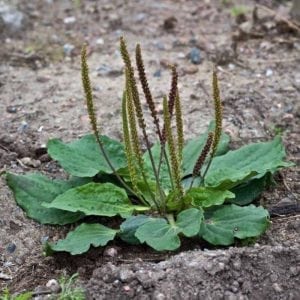Plantain: Herb of the Week
The common plantain plants – Plantago major & P. rugelii & P. lanceolata – are medicinially identical, so we’ll cover all of them together in our entry this week.
Break Up Biofilms
When we say “plantain”, you might think of those little banana-like fruits – but that’s not the plantain we mean. Instead, we’re referring to this lovely green leafy friend.
Plantain is always found in paths and dirt roads, and in fact, many cultures name this plant accordingly: in Russian, for example, it’s podorozhnik: “the one by the path.” Plantain loves to live in that hard, compacted soil, and breaks through it with its long roots – and I love the parallel there with one of its medicinal actions: its ability to break up biofilms.
Biofilms are pathogens’ way of glomming together to fight against our immune systems, but plantain (and many other herbs) can break through, like an herbal game of red rover. That break-through action allows our immune systems (and also antibiotics, if they get involved) to fight against infections that are resistant. This activity is only enabled if you get the plantain in touch with the infected area – you can’t just drink tea to heal a skin infection, for instance – so poultices and compresses are the way to go. Of course, if the infection’s in the guts, then tea will do just fine.
Heal The Gut
This is a monsterously large plantain we found on Commonwealth Ave here in Boston last summer. Such a beauty!
Plantain figures prominently in our gut-heal tea blend. That’s a formula we adopted from the teachings of Paul Bergner, and it’s probably the tea we make most frequently for clients. Plantain goes in because it can help the cells of the intestinal tract grow more quickly to heal wounds, irritation, and inflammation (think ulcers, IBS, and all kinds of gut irritation).
We refer to plantain as a “cell proliferant” or a “vulnerary” herb – so if you’re looking for other herbs to do that, you can search on the term “vulnerary”. We like to blend in calendula as well – it’s another vulnerary, and meadowsweet from last week is too. Then we add in chamomile to help with gut cramping, catnip if there’s any heartburn or nausea, ginger to settle the stomach (and to taste great!), and fennel if there’s any gassiness. This is a blend that tastes great and works great: you should try it!
Love Your Liver
Did you know plantain is also hepatoprotective? It’s big on the liver love! Plantain taken internally will reduce inflammation and encourage the recovery of irritated liver cells.
I’m always so excited about the gut-healing action and the biofilm-busting immune system support, but the truth is, any day that you can boost your liver function is a healthy day. It’s responsible for metabolic, digestive, immune, and endocrine duties in the body, to name just a few – it’s actually pretty amazing, all the things that your liver does to keep you going strong!
And it’s really amazing that this one plant can boost three such important systems in the body: your digestion, your immune response, and your liver – so go make yourself a big pot of plantain tea tonight! (You can do it – plantain has those very strong “ribs” on the back of the leaves that make it pretty easy to find even after dark.)
Want to learn more about herbs that can make your life better? Check out our Materia Medica program – it’s a complete herbal toolkit to keep you healthy and strong!
2 Comments
Leave a Comment
You must be logged in to post a comment.

Join our newsletter for more herby goodness!
Get our newsletter delivered right to your inbox. You'll be first to hear about free mini-courses, podcast episodes, and other goodies about holistic herbalism.




[…] discussed include violet, dandelion, garlic mustard, lamb’s quarters, plantain, linden, nettle, mulberry, blueberry, barberry, basil, sage, parsley, dill, cilantro, radicchio, […]
[…] discussed include calendula, plantain, wild lettuce, & cayenne; plus formulas including joint liniment and sprain & strain […]